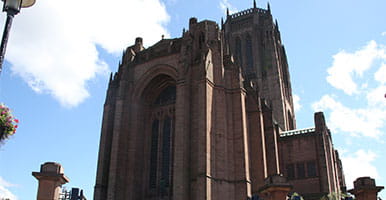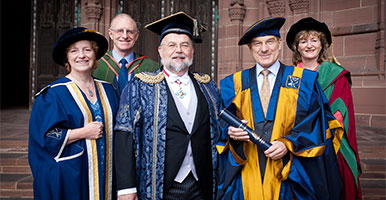Sir Brian Leveson
Presented by David Lynch
Honourable Pro-Chancellor, I have pleasure in presenting the Right Honourable, Lord Justice Leveson, for the award of an Honorary Fellowship from Liverpool John Moores University.
This is a truly civic university, firmly rooted in this extraordinary city, and each July, during Graduation Week, the University's highest honour – an Honorary Fellowship – is bestowed on a select band of individuals outside the University, in recognition of their outstanding achievement in a given field or profession, and who personify and inspire others to hold fast to the University's defining ethos of: dream, plan, achieve.
We propose Lord Justice Leveson today for his outstanding contribution to the legal profession, following a distinguished judicial career and many years of dedicated public service.
I read recently in a Chronology of World History that 1957 was a particularly newsworthy year. Russia launched Sputnik One into outer space, My Fair Lady opened in the West End and John Braine wrote Room at the Top. However, those achievements, significant as they were, must be compared to a then little publicised event which took place in South Liverpool in the autumn of that year.
Two fresh faced eight-year olds presented themselves and were admitted to the same form in Liverpool College's David House. They were Henry Brian Globe and Brian Henry Leveson. No doubt their teachers found them very attentive pupils and could be forgiven for not spotting immediately the wealth of talent appearing before them. Henry Globe went on to become the Recorder of Liverpool and subsequently a High Court Judge and Brian Leveson, a High Court Judge and then a Lord Justice of Appeal.
Brian's route to the Bench took him to Merton College, Oxford and call to the Bar by Middle Temple in 1970.
He practised on the Northern Circuit from chambers in Castle Street, Liverpool, across the full range of common law, crime, personal injury and commercial work. I first met him over 40 years ago when he called at my home to take over the reins of Secretary to the Liverpool Middle Temple Society. I weighed him up then and predicted that there were reasonable prospects of a very successful career in the law.
We became good friends and I was pleased to watch his career take off to such an extent that he was appointed Queen's Counsel in 1986 and Crown Court Recorder in 1988. We took the judicial oath as recorders together here in Liverpool before Mr Justice Caulfield. I recall our swearing in had been delayed as we were defending together in a case before the High Court judge in Chester. Whilst in silk, Brian led for the Crown in many high-profile cases including that of Rosemary West in 1995 for the Cromwell Street murders.
I am convinced that in 2000, simply to fulfil my earlier prediction, Her Majesty appointed Brian a Judge of the High Court, Queen's Bench Division. I believe that the Prime Minister and the Lord Chancellor had some small say in the matter.
Between 2002 and 2005 Brian was a Presiding Judge of the Northern Circuit with administrative responsibility for all the criminal and civil courts in the North West and for the circuit's complement of over 1,000 barristers, as well as trying many high profile cases in Merseyside and beyond.
Later in 2005, he was appointed to the new position of Deputy Senior Presiding Judge of England and Wales and in 2006 he was made a Lord Justice of Appeal and sworn of the Privvy Council. There then followed a three-year term as Senior Presiding Judge for England and Wales, and in 2010 he was appointed to the new role of Chairman of the Sentencing Council whose task it is to promote greater transparency and consistency in sentencing, whilst maintaining the independence of the judiciary.
Of course, these duties were in addition to his demanding daytime job as a judge of the Court of Appeal.
For those of you who have been holidaying up the far reaches of the Amazon for the past eight months, let me tell you that Lord Justice Leveson has been chairing an Inquiry which, later this year, will report and make recommendations for a more effective policy supporting the integrity and freedom of the press while encouraging the highest ethical standards.
Afterwards he will resume his duties in the Court of Appeal and as Chairman of the Sentencing Council and of the Criminal Justice Council, and Chairman of the Council of University College School, London and as a Foundation Governor of Liverpool College. The list is exhausting but not exhaustive. I have watched the Inquiry on the television news from time to time and I am anxious to say nothing which might force them to start all over. Therefore the only comment I make is that I salute his industry and his patience.
Most importantly, Brian has not forgotten his Liverpool roots. Despite his extremely busy schedule, he finds the time to return to the local courts and in October 2010 delivered the Conkerton Memorial Law Lecture in this cathedral. Two months later he came back, this time to the Philharmonic Hall, to give the Roscoe Lecture on 'Criminal Justice in the 21st Century'.
Thus, it is with great personal pleasure that I present the Right Honourable Sir Brian Leveson, this most distinguished son of our city, for admission to our highest honour, as an Honorary Fellow of Liverpool John Moores University.



